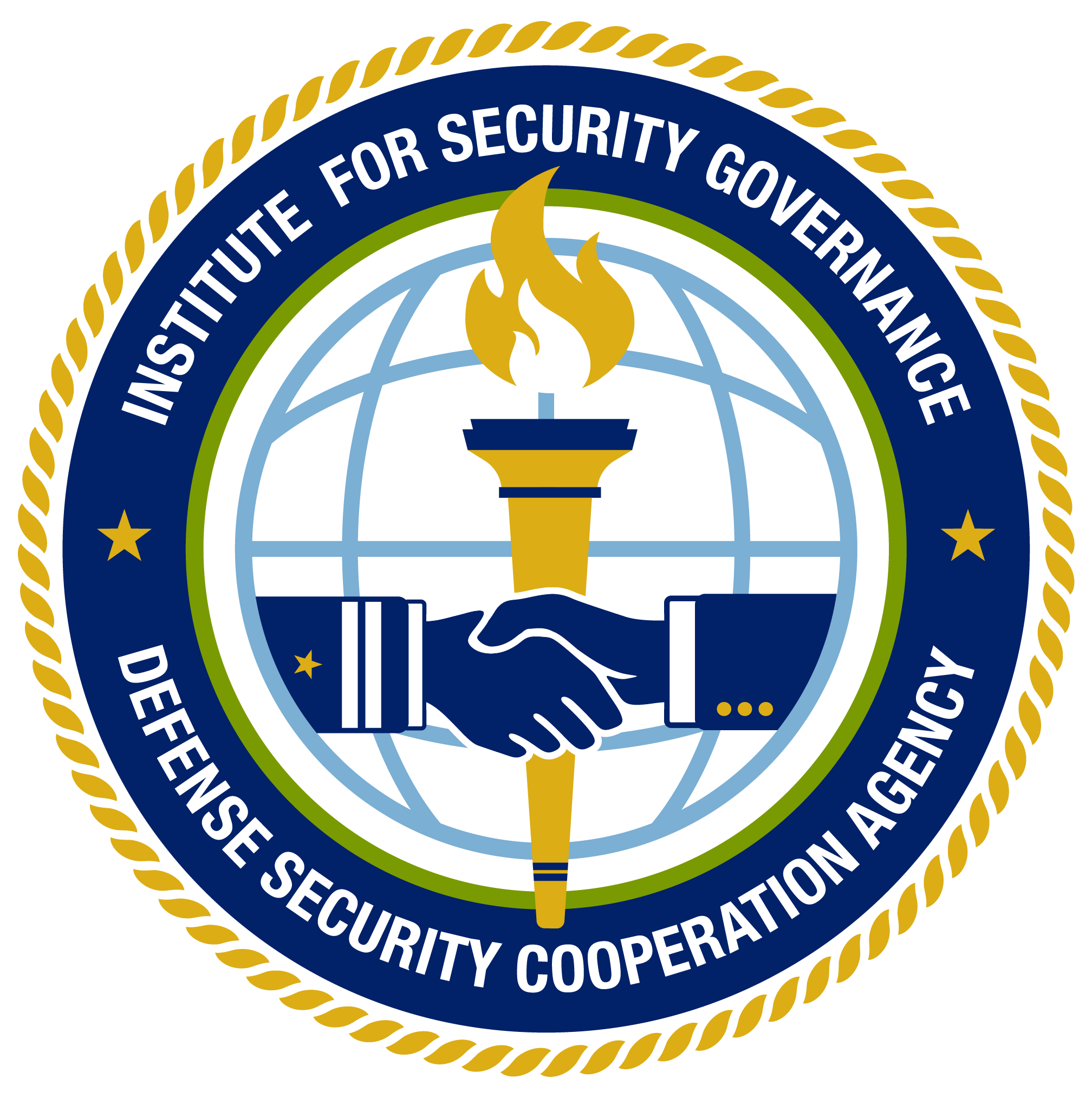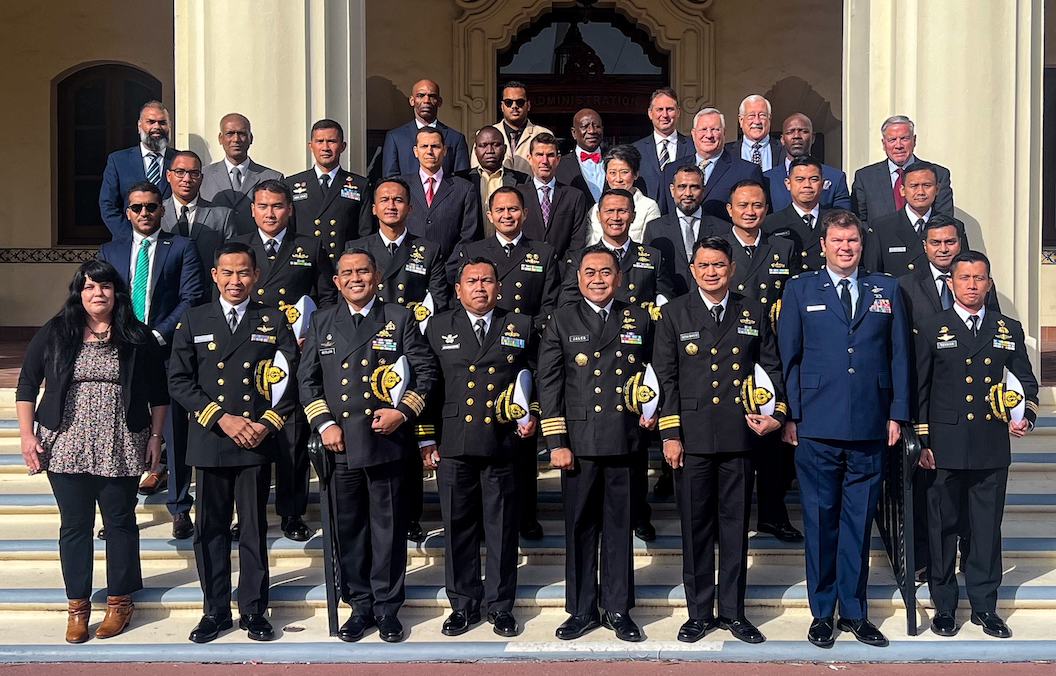A NEW COHORT LEARNS THE FUNDAMENTALS OF MARITIME SECURITY AT ISG - Defense Security Cooperation University
ABOUT
defense security cooperation university
2800 defense pentagon, washington, dc 20301-2800
commercial telephone: 571-372-3728 (571-372-DSCU)
international toll-free: 833-438-3728 (833-GET-DSCU)
information requests: dsca.dscu.info@mail.mil
Social Media:
STUDENT SUPPORT
the school of sc studies
the institute for security governance
naval support activity monterey
1635 cunningham road (bldg, 259), monterey, CA 93943-5011
commercial telephone: +1 831.656.3171
fax: +1 831.656.3351
email: ISGINFO@NPS.EDU
website: instituteforsecuritygovernance.org
Social Media:
the defense institute of international legal studies
441 elliot avenue, newport, ri 02841-1531
commercial telephone: 401-841-6000
website: dscu.edu/diils
Social Media:
publications & resources
sc certification
-
ABOUT
- DSCU
- CAREERS & OPPORTUNITIES
-
ADDITIONAL INFO
defense security cooperation university
2800 defense pentagon, washington, dc 20301-2800commercial telephone: 571-372-3728 (571-372-DSCU)
international toll-free: 833-438-3728 (833-GET-DSCU)
information requests:
dsca.dscu.info@mail.mil
Social Media: - ABOUT
- STUDENT SUPPORT
- SSCS
-
ISG
- ABOUT
- OUR WORK
- NEWS
- RESOURCES
-
ADDITIONAL INFO
naval support activity monterey
1635 cunningham road (bldg, 259), monterey, CA 93943-5011
commercial telephone: +1 831.656.3171
fax: +1 831.656.3351
email: ISGINFO@NPS.EDU
website: instituteforsecuritygovernance.org
Social Media: - ISG
-
DIILS
- ABOUT
- LEARNING
-
ADDITIONAL INFO
441 elliot avenue, newport, ri 02841-1531
commercial telephone: 401-841-6000
website: dscu.edu/diils
Social Media: - DIILS
- RESOURCES
- CERTIFICATION
-
DSCU

Defense Security Cooperation University
CSOD Prelaunch Message
NOTE: A Common Access Card (CAC) and CSOD account are required
Registration is completed using a system called Cornerstone on Demand (CSOD) hosted by the Defense Acquisition University (DAU). You will sign in to this system on the next screen.
If you currently occupy a Security Cooperation Workforce position and do not see any courses listed after signing in to CSOD, please press the button at the top of your screen to open Frequently asked questions, and read the solutions under the "CSOD Sign In Issues" category.
Press the button below if you are ready to proceed. If you have trouble signing in, press the the next screen's "Need help signing in?" link To Get help.
Defense Security Cooperation University
Certification Center Prelaunch Message
NOTE: A Common Access Card (CAC) is required to access the Certification Center
If you receive an "Untrusted Site" or "Untrusted SSL Server Certificate" error when trying to access the Certification Center, please follow the instructions in the link below to update your Internet browser's certificates, and then try again.
How to Update Browser Certificates for the Certification Center

Jan 9, 2023
A NEW COHORT LEARNS THE FUNDAMENTALS OF MARITIME SECURITY AT ISG
By Jenny Leggett
The Institute for Security Governance (ISG) recently conducted a “Fundamentals of Maritime Security” Resident Course at ISG headquarters in Monterey, California. A range of mid- to senior-level military and civilian international participants were represented among the 26 attendees, who hailed from nine different countries, with a strong contingent from Indonesia. The two-week course is structured to provide participants with the strategic context shaping the maritime space in the early 21st century; an overview of various maritime transnational threats; risk and governance self-assessment exercises; an in-depth look at maritime domain awareness requirements and capabilities; and coverage of strategies, solutions, and best practices for governments to effectively prevent, prepare for, and manage the consequences of various maritime threats.
Among the various methodologies, discussions, case studies, and classroom exercises, this course notably featured a presentation from Mr. Shanaka Jayasekara – the Global Maritime Crime Program (GMCP) Manager for Southeast Asia/Pacific at the United Nations Office of Drugs and Crime (UNODC). Participants learned about the mission of the Global Maritime Crime Program and its work to improve regional cooperation and maritime law enforcement capabilities. Nations of the world are economically and militarily connected by the sea, yet many U.S. partners lack the capabilities and the capacity to establish and maintain their maritime sovereignty and security. Mr. Jayasekara’s presentation covered the scope and breadth of UNODC’s mission “To improve the capabilities of member states’ criminal justice systems to prevent, interdict, investigate, and prosecute maritime crime through a sound rule-of-law framework and effective international cooperation.”
As an added practical dimension to the coursework, participants received briefings on the United States Coast Guard’s (USCG) roles and statutory missions at USCG Station Monterey, and toured the 47-foot Motor Lifeboats, smaller craft, and the 87-foot Cutter HAWKSBILL. As is the case with many courses at ISG, participants joined one another in social activities and excursions, helping to foster personal relationships and professional connections that will last well beyond the course.
Speaking to the success of the course, Course Director Timothy Doorey noted, “By the end of the two-week course, participants from the nine different countries had become close friends and colleagues. They will take home what they learned during the course, their experiences inside and outside the classroom, and use the informal networks to enhance their professional careers.”
At the conclusion of the “Fundamentals of Maritime Security” course, participants are meant to:
-
Understand the various “drivers” impacting global maritime security in the early 21st century;
-
Understand transnational maritime threats and trends, i.e., piracy, terrorism, smuggling and trafficking, and IUU fishing;
-
Evaluate and prioritize their national and regional maritime transnational threats and risks;
-
Assess their nation’s maritime governance strengths and weaknesses;
-
Understand the elements of maritime strategy development at operational and strategic levels;
-
Describe best practices to recruit, vet, train, assign, and retain talented maritime security professionals.
Additional Maritime Security courses that explore strategic and operational level best practices, and innovative solutions to address common challenges are available for programming in both the resident format at ISG as well as in the mobile format in-country. These courses address issues such as understanding transnational maritime threats; integrating civil, military, and law enforcement agencies with maritime security responsibilities; and leveraging regional and other international governmental and non-governmental resources.
Learn more about how ISG is working to help Partner Nations identify, assess, and better understand Maritime Security issues in this ICB Smart Sheet.